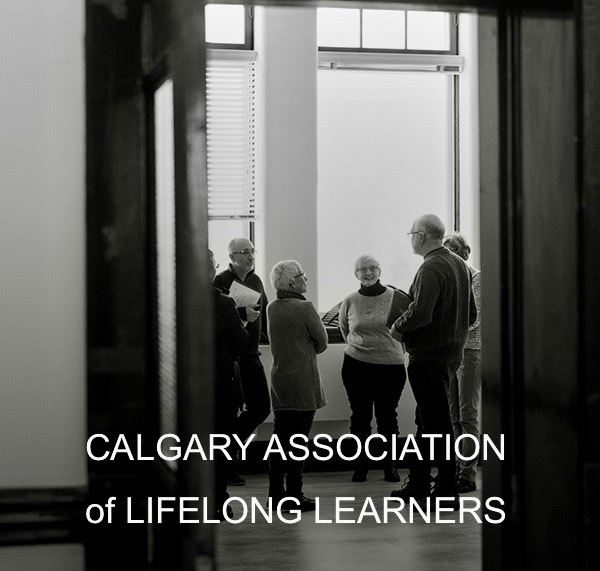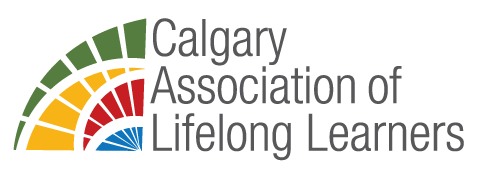CALL - a unique lifelong learning association
Read how Calgary Association of Lifelong Learners (CALL) provides a unique model of affordable, innovative, and flexible learning for mid-life and older adults.

What comes to mind when you read the phrase "lifelong learning" and if you are interested in learning throughout your lifetime, where do you look for opportunities to engage in Calgary?
In this blog article, our first for CALL, Author Maureen Osis, CALL volunteer talks with Linda Flanagan, Past President, about the Calgary Association of Lifelong Learners. We:
- share our views on the meaning and importance of lifelong learning.
- acknowledge the vision of the founders; five individuals who started CALL in 2011.
- explore how CALL delivers a variety of programming and why the approach is so unique.
Importantly, we explain how CALL is able to provide programs that are affordable, innovative and flexible. After learning more, maybe you want to join us?
What is CALL - Calgary Association of Lifelong Learners?
CALL - Calgary Association of Lifelong Learners is a member-led non-profit organization incorporated under the Societies Act of the Province of Alberta in February 2011. CALL’s mandate is to facilitate lifelong learning for residents of Calgary and area. Programs and activities are wide-ranging, focusing on arts and culture, society and politics, and health and science."
CALL's Mission is: The Calgary Association of Lifelong Learning facilitates affordable, innovative and flexible learning opportunities for adults.
CALL’s mandate is to facilitate lifelong learning for residents of Calgary and area. Programs and activities are wide-ranging, focusing on arts and culture, society and politics, and health and science."
In an article by cSPACE Marda Loop in 2017, CALL was described:
At the heart of CALL’s philosophy is a collaborative peer learning system, built on a belief in the value of sharing freely with others. The organization’s .... members are often respected leaders in their fields and from academic backgrounds, keen to offer mentorship and contribute to a multi-generational and diverse community at Marda Loop.

Photo courtesy of CSPACE Marda Loop.
What is Lifelong Learning and Why is it Important?
"There is no end to education. It is not that you read a book, pass an examination. The whole of life, from the moment you are born to the moment you die, is a process of learning." Jiddu Krishnamurti
My generation (seniors) might be forgiven for thinking that "lifelong learning" applies to those who are working; in the past this might have included on-the-job training and professional upgrading. This was our experience.
However, because society constantly changes and evolves, individuals can also find new ways to change and evolve, adapting to new innovations as they come along. Lifelong learning, then, can be thought of as all the activities that help one to develop knowledge, skills and competencies, throughout a whole lifetime.
I asked Linda Flanagan, with her wealth of experience in the educational field, how the concept of "lifelong learning" has been applied in the field of education and how CALL thinks about lifelong learning.
How has the concept of "lifelong learning" influenced education?
Educational institutions around the world have embraced the concept of lifelong learning. Learning doesn’t end with a diploma or degree. Education is widely seen to continue beyond formal schooling into the workplace and beyond. After all – as an older adult, I often reflect on how much learning I have had to do just to keep up with the unbelievable pace of changing technologies. Therefore, many school districts have Mission statements that include something like the Calgary Board of Education’s: (students will) “complete high school with a foundation of learning necessary to thrive in life, work and continued learning.
(Calgary Board of Education Mission Statement.)
With this goal in mind, as well as teaching skills and knowledge, teachers are increasingly focused on teaching students how to learn.
How does CALL think about "lifelong learning?"
CALL members believe that continuing to learn in retirement is essential and inherently rewarding. We understand the benefits of learning for brain health and social connection. Our members want to keep current with our changing world and want to be active participants in creating knowledge, learning new skills and sharing their own wisdom with others.
The Origin of CALL: The Five Founders
In July 2013, Calgary Herald Neighbours interviewed the Five Founders of CALL and talked about their "Love for Learning."
Bob Stamp, a retired professor in the University of Calgary's Faculty of Education, expressed his belief that "you've got to keep your brain active." Bob and his wife Arlene, a retired visual artist, had joined the Osher Lifelong Learning Institute at the University of California during their winter trips. Returning home, the Stamps were certain that many older adults in Calgary would share their love of learning and immediately found three who did: Don Smith, another University of Calgary professor, along with Carol Gerein and Barbara Grant.
Within the first year, they were joined by others who formed a Steering Committee; Pat Hogan, Gail Kingwell, Linda McFarlane, Anne Petrie, Tamara Seiler, Ona Stonkus, and Murray Vines.
Don Smith, Past President of CALL, wrote about the origins.
"The beginnings of the CALGARY ASSOCIATION OF LIFELONG LEARNING (CALL) date back to the summer of 2010. Arlene and Bob Stamp, Don Smith, Carol Gerein, and Barbara Grant, first developed the idea. The initiating group wanted to establish a member-led lifelong learning non-profit organization in our city; one dedicated to the needs of older adults with a passion for learning and staying actively involved in the community."
Subsequently, CALL was incorporated as a registered non-profit organization on February 8, 2011. In 2018 CALL became a registered charity.
CALL Original Programs
Programs for members members began in the fall of 2011. By 2013, CALL had grown to 400 members. Many were willing to share their experiences and facilitate a variety of interest groups on diverse subjects and activities; such as:
Some of these original programs have endured, such as two that attract large audiences today.

CALL Café is a monthly afternoon program with topical speakers. Members socialize, and can bring guests and introduce them to the value of membership in CALL.

Treks and Travels is a popular monthly evening presentation where members are given the opportunity to share their travel experiences and their knowledge about all parts of the world. The public is welcome to attend for a small fee.
CALL - a Unique Design of Lifelong Learning
"The interest of many older adults is in learning for the joy of learning -- without examinations or grades -- and keeping in touch with a larger world."
Osher Lifelong Learning Institutes
Firstly -- and very importantly -- there are no exams. No grades. Just many opportunities to engage in learning for the JOY of it.
Some people might assume that "lifelong learning" at CALL is equivalent to continuing education programs. For example, there are organizations that charge a small membership fee and then individuals can pay for and attend specific courses offered at educational institutions. The courses are set by the institution and the instructors are hired to teach.
In contrast, the founders of CALL developed a model of peer learning. All programs are organized by CALL members for members. In some instances, CALL members act not only as facilitators, but also provide the content. One good example of this is Treks and Travels, mentioned earlier. For other speaker events, CALL attracts well-known experts.
In 2017, CTV Calgary Darrel Janz recognized Tamara Seiler, CALL's first President, as his "Inspiring Albertan."
Inspired to foster lifelong learning in older adults.
Tamara described the unique model developed by CALL.
“Call is a grass-roots organization made up entirely of volunteers attracted to learning for its own sake. Call uses a democratic style of learning – peer learning – one that allows an expanded number and nature of learning opportunities but also a model that is ‘nimble’ – able to respond quickly to opportunities as they come along.”
I asked Linda to talk about peer-led learning; what does it mean and how is it used by CALL.
What does peer-led learning mean? How do CALL members participate in peer learning?
Unlike many other lifelong learning organizations, CALL is rooted in the principles of peer-led learning rather than the lecture model. Our facilitators are not usually ‘experts’ in an area but rather they set up a group where the members study and learn together about a topic of shared interest. When we do listen to a lecture by an expert we always try to incorporate discussion, questions and personal reflection. Peer-led, active learning is core to our organization’s beliefs about lifelong learning.
CALL began with five people with a shared vision and rapidly grew to 400 members. CALL's success has continued for more than a decade, even during the pandemic.
I asked Linda to share her thoughts about CALL's success.
How do you explain CALL's success?
CALL clearly tapped into a need in our community. Although originally founded by retired academics, it quickly attracted people from all walks of life. By not being associated with a university, CALL is more open and accessible to everyone.
The fact that we flourished during pandemic lockdowns was a surprise – although it shouldn’t have been. Our members were open to the challenge of online learning with Zoom. We found ways to continue many of the discussion groups and were able to attract presenters from beyond our city. It became clear that CALL is really important to our members. They weren’t willing to give it up even when forced to stay in their homes. Today CALL is a volunteer-run organization with no university affiliation or staff. CALL members provide all the technical support, web development, accounting and bookkeeping, facility booking, communications and of course programming.
In short, CALL is a community dedicated to learning for the sheer joy of it, where members share their knowledge and life experiences. It is indeed a unique approach to lifelong learning.
In the December 2023 Newsletter, Edna Einsiedel summed it up in her article, CALL Beginnings - An Historical Note.
"With its current roster of more than 800 members and over 50 interest groups, CALL continues to remain a vibrant and enriching organization, driven by the enthusiasm and participation of its lifelong learners."

AUTHORS
Maureen Osis
Maureen retired from her career -- first as a Gerontological Nurse and then a Marriage/Family Therapist in private practice working with mid-life and older adults. Maureen has published numerous articles and books, related to her professions. She is a volunteer with CALL, doing social media and the primary author of the blog because she likes to face new challenges.
Linda Flanagan
Linda is a retired educator who spent 30 years as a teacher, district administrator and principal. She completed a Master’s degree in Educational Technology in 2001. Linda has been active in CALL for the past six years, volunteering on the WebTeam and serving on the Board, most recently as President (2022/23)
Return to top


Learn more about CALL
Check out the Interest Groups offered to CALL members
Learn more about membership in CALL.
Questions/Feedback? Please contact us
info@calgarylifelonglearners.ca
Follow us on Facebook
